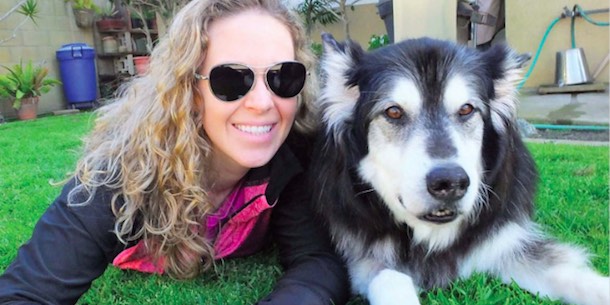After serving as a Marine Corps medic for an artillery unit in Iraq and returning to the seeming quiet of California, Blade wanted to kill himself. He admitted this to Clarissa Black, an animal trainer and the founder of Pets for Vets, a California-based organization that pairs shelter animals with veterans. The day before Blade applied for a companion dog — a remedy, he hoped, for post-traumatic stress disorder, nightmares, alcoholism, and sudden rage — he’d called a suicide hotline.
“He said, ‘I need someone to love me,’” Black recalls.
Black felt a connection to Blade, as she had with so many other tormented vets. She worked to find his perfect four-legged match, and eventually discovered D.D, a calm yet playful pit bull/Labrador mix. The dog’s face, like Blade’s, bore scars. She’d been abandoned and suffered from mange, a skin condition caused by mites, which decimated her fur.
Black and her colleagues nursed D.D back to health. They trained her to meet Blade’s needs and finally introduced them — a meeting that Black calls miraculous. When Blade’s and D.D’s eyes met, his anguish seemingly vanished. He curled up with D.D on her bed and held her paw. The dog soon helped ease his nightmares. She’d been trained to recognize his tossing and turning and nighttime moaning. When dreams plagued him, D.D woke him. When his anger surged, her presence soothed him. Eventually the nightmares stopped. “D.D saved my life,” he says.
That’s the mission of Pets for Vets: to assist and comfort veterans suffering from depression, anxiety, PTSD, and traumatic brain injuries. Since 2009, when Black formed the organization, the nonprofit has matched roughly 300 veterans with animals — primarily dogs, but also cats and even rabbits. It’s a life-saving win-win scenario: The animals are rescued, but so are the vets. Roughly 1.5 million dogs and cats are euthanized each year in the United States, and up to 20 percent of Iraq and Afghanistan vets suffer from major depression or PTSD. In a 2015 Washington Post-Kaiser Health poll, half of Afghanistan and Iraq vets said they knew a fellow veteran who had attempted suicide.
For Black, her role as a veteran’s best friend began at a local VA center. She had volunteered to revamp the VA’s dog therapy program and brought along her pooch, Bear. The husky/malamute mix brightened the veterans’ moods. He nuzzled with bedridden soldiers and wagged his tail as vets labored through mobility exercises. And Black wondered: Why are these encounters only happening one hour a week? Why aren’t they occurring every day in veterans’ homes?
She was 26 when she launched Pets for Vets, which now has 35 chapters nationwide (she eventually wants programs in all 50 states). For each animal and veteran, the goal is to create what Black calls a super bond: “An undeniable emotional and chemical connection in which the pair are so in tune they can anticipate each other’s needs.” To create that bond, the organization needs personal information, so vets complete a detailed application and attend numerous meetings with the trainer.
“We want to know about their personality, their lifestyle, their expectations, and how they’re going to connect with the animal,” she says. “And then we go to the shelters and rescue groups and look for an animal with the right temperament. This isn’t just about the human. It’s also about the dog. The match has to be right.”
Once the animals are selected, they receive training, which includes not only basic commands — sit, stay, come, fetch — but behaviors such as eye contact, which boosts oxytocin (a feel-good hormone that can reduce stress) in both humans and pets.
The effects are transformative. Some rejuvenated veterans now take their dogs to VA hospitals, providing comrades with a warm-and-fuzzy morale boost. Other veterans have built new lives. Black worked with a vet named Gordon who served as an intelligence analyst in the Gulf War and in Bosnia. He struggled with PTSD, anxiety, loneliness, isolation. He endured nights of poor sleep, was nervous around people, and uncomfortable when they approached from behind. Then Black paired him with Suki, an Australian Shepherd mix.
“He said that on the first day he had Suki, he met more people than he had the entire previous year,” she says. “It’s that social lubricant that a dog provides. Five years later, he’s looking to buy a house, he just got married, he’s going to adopt some kids with his new wife — it’s been incredible to watch.”
Black says it’s gratifying — and humbling — to see the suffering diminished in people and pets, and to receive invitations to weddings and baby showers after placing animals.
“What I love most is receiving text messages after a match,” she says. “They say, ‘Look at us! Look at what we’re doing! We’re taking a walk today!’ I love seeing the smiles on the veterans’ faces and the happy body language of the dogs. One gentleman told me that he lost his heart and soul in Iraq, but his dog helped him navigate the minefield of his emotions. Just seeing how his dog interacted with the world, he was able to love again.” And yes, that veteran recently got married.
Ken Budd has written for The New York Times, Smithsonian, McSweeney’s, and National Geographic and is the author of The Voluntourist. For more, visit thevoluntouristbook.com.
This article is featured in the January/February 2018 issue of The Saturday Evening Post. Subscribe to the magazine for more art, inspiring stories, fiction, humor, and features from our archives.
Become a Saturday Evening Post member and enjoy unlimited access. Subscribe now



